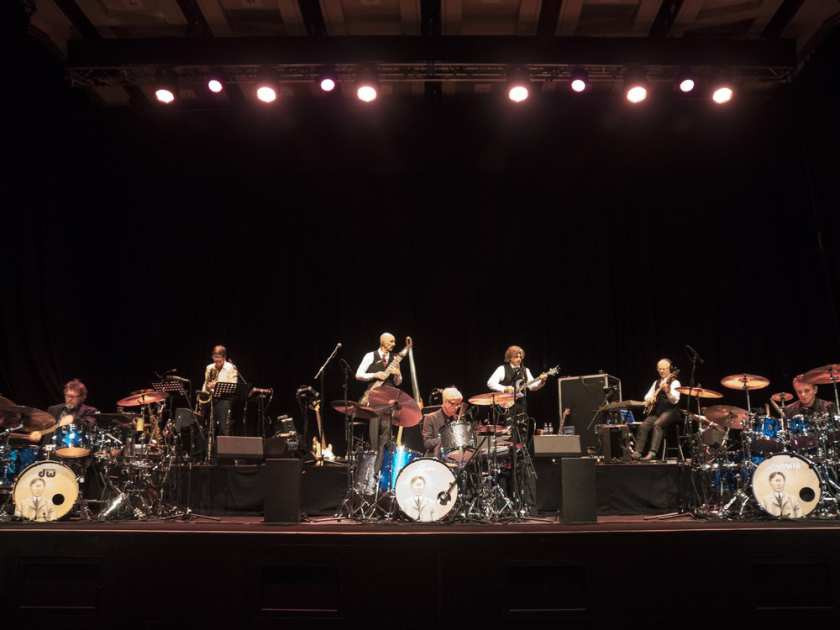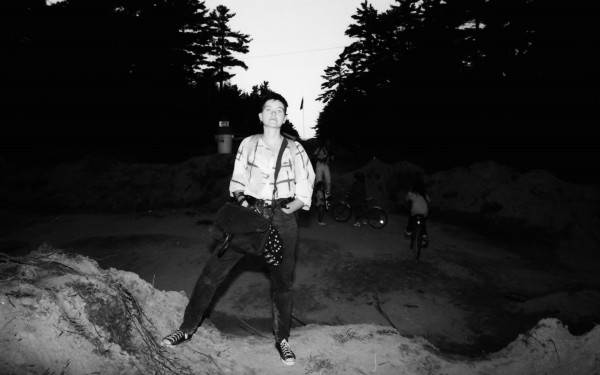REVIEW: King Crimson, Handle With Care
Barons of 70s Psych Play Montreal
It’s exceedingly difficult to explain just how important and influential a band King Crimson is.
Their first studio album, 1969’s In the Court of the Crimson King, hit the music world like a bolt of lightning and served as a blueprint for the progressive rock movement for years to come. Larks’ Tongues in Aspic established the sonic and tonal framework for metal over a decade before the popularization of the genre. And lest we forget Red, a record that hinted at the clockwork rhythmic stylings of late-80s math rock.
And they did all this within a 5 year timeframe.
With this impressive pedigree in mind, I didn’t anticipate King Crimson’s show at Théâtre St-Denis on Nov. 17 like any other rock show. It’s more appropriate to approach such an event like you would an academic lecture or a symposium; to expect an intellectual excursion meant to stimulate, challenge and bewilder.
Think Noam Chomsky with a Les Paul having a jazz fusion nightmare.
Two guitarists, a bassist, a flute and brass player and three drummers with full kits take the stage without any pomp—free of the expected “good evening Montreal.” The players are here to play, and they humbly take their positions without saying a word. There are no screens; no pyrotechnics; no intricate light show. What follows is simply two hours of relentlessly engaging music, characterized in equal parts by precision, improvisation and guts.
The setlist, which varies from show to show, is tonight made up of material spread across 46 years. There are recent songs, and old songs, and fucking old songs, and new songs altogether. What’s truly remarkable is the continuity between pieces—that there are no softballs thrown for nostalgia’s sake. Everything is approached with the same spirit of musicianship and innovation.
Old songs sound new; new songs sound old. Timelessness reigns supreme, as with most things Crim. Just ask Yeezy.
The three drummers occupy the front of the stage, accomplishing the seemingly impossible: they pull it off. They play hard, and they play soft. They stay out of each other’s way and, and they clash. Their interaction evokes a gymnastic coordination that leaves the mouth agape, as if an extra orifice is needed to absorb the meticulous cacophony they’re producing.
And behind them, center-left (a politically agnostic observation) is the man Peter Gabriel has called “the king of the bottom end,” bassist Tony Levin. The slim, bald and towering legend lays the rhythmic foundation with a four-string guitar, a 12-string Chapman Stick and an electric upright. He sends the crowd into a frenzy when he straps on his iconic “funk fingers”—two broken off pieces of a drumstick taped to his index and middle fingers.
Fine. Now there are four drummers.
To his audience-left, Mel Collins, the man who made the sax do previously unheard of things back in ‘69. He’s the troublemaker, the one that keeps the ship on the honest course—although not necessarily the straightest one. Before any hint of musical complacency sets in, he bursts the saloon doors open with his six-shooter cocked and ready to fire off chaos in melodic form.
Then there’s Jakko Jakszyk, the stalwart backup guitarist and main vocalist who carries along lyrics written and sung by enough men to warrant an annotated bibliography. You root for him to succeed in his endeavour, and to your delight, he does.
And finally we come to the one who started it all; the founding member of the operation. The soft-spoken, bespectacled and enigmatic ringleader of King Crimson, Mr. Robert Fripp. The man who’s voice is heard in a pre-show recording as the audience files into their seats, setting the tone for what’s to come.
“We would really appreciate if, during the performance, you turned off your phones, cameras and recorders while we’re playing,” Fripp announces, invisible but already present. “Use your eyes. Use your ears. Exist in the moment.”
During the encore, an audience member disobeys. He holds up his phone to snap some pictures.
“Regrettably, a persistent cameraperson persisted with camera,” Fripp will note in an online post the following day. “This was a distraction.”
Seeing the telltale glow emanating from the small, rectangular device, Fripp stops playing and slowly raises his arm, pointing his finger at the offender. He remains frozen in this pose for what feels like an eternity—a solemn statue commemorating the first sin, and calling for expulsion from paradise.
As the band continues playing, a burly security guard stomps over to the third row and yanks the obtrusive mobile away. While I can’t make them out, the guard says a few words to the stunned patron.
You were warned. I bet that’s what he said.
In many ways, this incident best encapsulates the essence King Crimson. The band, after all, is akin to a ceremonial knife: on one end, a comfortable, inviting grip laden with beautifully delicate ornamentation. But handle with care, for the other end is finely sharpened and eager to draw blood if mishandled.
However, if approached with care, bravery and patience, the court of the crimson king is an ethereal place—one that you’ll feel privileged to have inhabited.


_600_832_s.png)

_600_375_90_s_c1.jpg)
_600_375_90_s_c1.jpg)

3_600_375_90_s_c1.jpg)